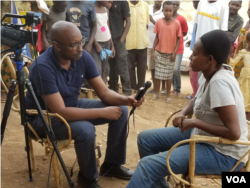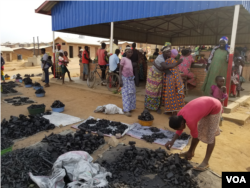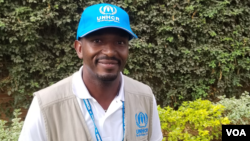Political unrest and violence prompted more than 400,000 people to flee Burundi and relocate to nearby countries, primarily Rwanda, Uganda and Tanzania. Despite appeals from Burundi and other central African countries to leave their camps and repatriate, Burundian political refugees say they wouldn’t feel safe going back home.
Refugees who spoke to VOA say they fear government persecution if they return to Burundi, where President Pierre Nkurunziza remains in power after defying both domestic and international opposition to pursue a third term in 2015.
One such refugee is Jacqueline Nduwayezu, a former secondary school teacher who is now living with her six children in the Mahama refugee camp in eastern Rwanda.
“We are here because there is no security in our country,” Nduwayezu told a VOA Central Africa reporter who recently visited the camp. "It was not out of fun that we walked for miles and abandoned our homes and land. It is because the threat was real. People were being killed and are still being killed and dumped in mass graves and rivers."
Eloge Rugemangabo, who heads the refugee community in Mahama, says he was beaten by the pro-government Imbonerakure milita because he was a member of the opposition MSD party.
"I was tortured and discriminated against at work. I slept outside for three days for fear of being killed," he said.
He says conditions must be very different if refugees are to go back.
"We left our parents, houses, brothers and sisters, and in order for us to return we must be assured of security and protection from violence, from being killed and so on," he said.
Burundi: refugees fled 'rumors'
While visiting the Nakivale refugee camp in Uganda early this year, Burundi’s Home Affairs minister Pascal Barandagiye called on Burundian refugees to come back, adding that the country was ready to welcome its citizens.
“We are convincing them to return home and come to build their nation. Many are just scared or fled rumors," he said.
President Nkurunziza made a similar pitch during a visit to Tanzania in July.
“Today I want to tell Tanzanians and Burundians that Burundi is now peaceful and I am inviting all Burundi refugees to return home,” he said.
Tanzanian President John Magufuli echoed Nkurunziza's remarks saying, "I have been assured, the place is now calm."
But Amnesty International disagrees. The rights group released a report in September which said refugees who return home would be at risk of death, rape and torture from the security forces and the Imbonerakure, who it said continue to commit human rights violations against perceived opponents of the ruling CNDD-FDD coalition.
One man told Amnesty, “If you are not CNDD-FDD, you are considered their enemy.”
“Let’s be clear, Burundi has not yet returned to normality and the government’s attempts to deny the horrific abuses still taking place within the country should not be given credence," Amnesty's Burundi researcher, Rachel Nicholson, said in the report.
The United Nations refugee agency (UNHCR) warns that political and human rights conditions in Burundi continue to prompt increasing numbers of refugees to flee to neighboring countries in search of asylum.
The reasons for flight by most refugees have been the same, says Paul Kenya, head of the UNHCR office that oversees the Mahama camp.
“Most of them are fleeing persecution because of their perceived political opinion," he said. "Most of them did not accept the current president to go for a third term. Many of them flee because they were in demonstrations and others are following family members who already fled.”
A senior official at the Nakivale camp, John Bosco Sentamu, also reports a continuing influx.
“The number of refugees keep going up. We have a lot of walk-ins from Burundi,” said Sentamu.
Tough conditions
Earlier this year, UNHCR and partner agencies launched an urgent $429 million appeal to meet the needs of Burundian refugees across the region. But of the requested amount, only 19 percent has been provided, making the Burundians' situation one of the least funded refugee crises in the world.
In camps like Nakivale, refugees live in overcrowded shelters and have to endure shortages of everything, from food to water to healthcare. Sentamu says Uganda is generally hospitable to the refugees and Nakivale residents are given land to grow food. But he adds, "of late we were hit by the drought and for three seasons the refugees have not cultivated."
Felicien Habumugisha, 52, has lived in Nakivale for nearly 10 years, after fleeing an earlier wave of unrest in Burundi.
“Food is not sufficient, no education for our children, no sponsorship and no resettlement, especially for Burundians,” he said.
But Habumugisha says he is not ready to go back to Burundi. The son of politically active parents who were killed in Burundi, he said he was arrested, released and then "hunted" the last time he lived there.
“The politics of Burundi itself is not stable. We don’t feel that Burundi is safe today for us to go back," he told VOA.













